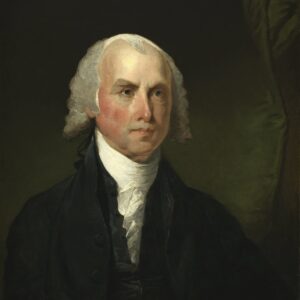James Madison, a former Delegate, from the Commonwealth of Virginia, to the Constitutional Convention, using the penname “Publius,” publishes “Federalist #45,” explaining the principle of federalism. In paragraphs four, six and seven he writes,
… The State governments may be regarded as constituent and essential parts of the federal government; whilst the latter is nowise essential to the operation or organization of the former. Without the intervention of the State legislatures, the President of the United States cannot be elected at all. They must in all cases have a great share in his appointment, and will, perhaps, in most cases, of themselves determine it. The Senate will be elected absolutely and exclusively by the State legislatures. … [E]ach of the principal branches of the federal government will owe its existence more or less to the favor of the State governments, and must consequently feel a dependence, which is much more likely to beget a disposition too obsequious than too overbearing towards them.
· · · · · ·
… The powers delegated by the proposed Constitution to the federal government are few and defined. Those which are to remain in the State governments are numerous and indefinite. The former will be exercised principally on external objects, as war, peace, negotiation, and foreign commerce; with which last the power of taxation will, for the most part, be connected. …
The powers reserved to the several States will extend to all the objects which, in the ordinary course of affairs, concern the lives, liberties, and properties of the people, and the internal order, improvement, and prosperity of the State. The operations of the federal government will be most extensive and important in times of war and danger; those of the State governments, in times of peace and security. As the former periods will probably bear a small proportion to the latter, the State governments will here enjoy another advantage over the federal government. The more adequate, indeed, the federal powers may be rendered to the national defense, the less frequent will be those scenes of danger which might favor their ascendancy over the governments of the particular States. [Emphasis added]
[restored 8/5/2022]
Subsequent Events:
Authority:
Articles of Confederation, Article XIII
ccc-2point0.com/Articles-of-confederation
References:
Robert A. Levy and William Mellor, The Dirty Dozen: How twelve Supreme Court cases radically expanded government and eroded freedom, (New York: Sentinel, 2008), 114.
Steven Yates, “When is Political Divorce Justified?” Secession, State and Liberty, David Gordon, ed., (New Brunswick, New Jersey and London: Transaction, 1998), 55.
Federalist No 45 – The Avalon Project
avalon.law.yale.edu/18th_century/fed45.asp
Federalist No. 45 – Wikipedia
en.wikipedia.org/wiki/Federalist_No._45


